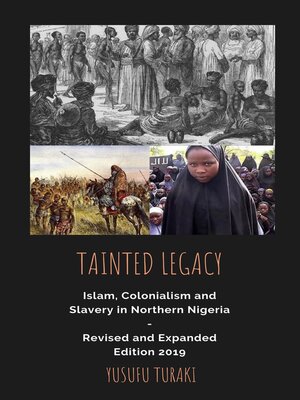Tainted Legacy--Islam, Colonialism and Slavery in Northern Nigeria Revised and Expanded Edition 2019
ebook
By Yusufu Turaki

Sign up to save your library
With an OverDrive account, you can save your favorite libraries for at-a-glance information about availability. Find out more about OverDrive accounts.
Find this title in Libby, the library reading app by OverDrive.



Search for a digital library with this title
Title found at these libraries:
| Library Name | Distance |
|---|---|
| Loading... |
Tainted Legacy
Islam, Colonialism and Slavery
in Northern Nigeria
Revised and Expanded Edition 2019
Yusufu Turaki
This is a revised and expanded edition 2019 of the tainted legacy released in 2017. This new edition included update to the chapters and an addition of Chapter 16 detailing specific ways the latest impact of islamization in having on Northern Christians and minorities.
The past twenty years have seen a spate of violent riots and other conflicts in Nigeria resulting in considerable numbers of Christian and Muslim dead, of churches and mosques destroyed, of homes and busi- nesses ransacked and burned. These incidents have taken place main- ly in the Middle Belt, where Christians and Muslims are present in approximately equal numbers. Recently, however, we have seen such violence occurring in the "northern North" itself, where Christians are a small minority. More often than not, Christians have been the targets of Muslim-initiated violence, perpetrated by groups ranging from gangs of young people to fully armed Islamist militias. Attacks by Muslims in the last ten years have killed thousands of Christians.
The climate of intimidation and fear that these repeated conflicts engender adds to an existing situation of anti-Christian discrimina- tion and marginalisation in the North. The vulnerability of Christians has been effectively enshrined in law in twelve northern states, where shari'a has has become the main source of civil and criminal law since 1999. Despite Muslim promises that Christians will be exempt, expe- rience has repeatedly shown the opposite. The fact that some Islamists are calling for an Islamic state in Nigeria, ruled by shari'a, is a cause of very serious concern for Nigerian Christians.
This valuable work by Yusufu Turaki shows how the present situation does not arise simply from ethnic differences, as is often suggest- ed, but is deeply rooted in the history of West Africa, dominated as it was by the mighty empires of the Sokoto Caliphate and the Sultanate of Kanem-Bornu and their Islamic colonialism. This Islamic rule was then consolidated by British colonialism, employing Lord Lugard's policy of indirect rule. The centralised administration of the Fulanis appears to have appealed to British minds. Lugard himself certainly held that Islam was a superior religion and culture and that the Fulanis' fairer skins made them "natural rulers" over the darker "pure" Africans. Thus the British set Muslims to rule over non-Muslims.
Both the Sokoto Caliphate and the Sultanate of Kanem-Bornu engaged in slave-raiding and slave-trading. The place of slavery in the teachings of Islam is little recognised, and the place of slavery in the practices of West African Muslims still less so. This work most help- fully details these two areas to embed in the reader's mind beyond any doubt the reality of both.
In recent years violent attacks by Muslims in Nigeria have left thousands of Christians dead. Much of the conflict has occurred in the Middle Belt, and also in the North where the Church is a small and vulnerable minority. Islamic sharia is the main source of law in the North, and some Islamists there are calling for the establishing of an Islamic state.







